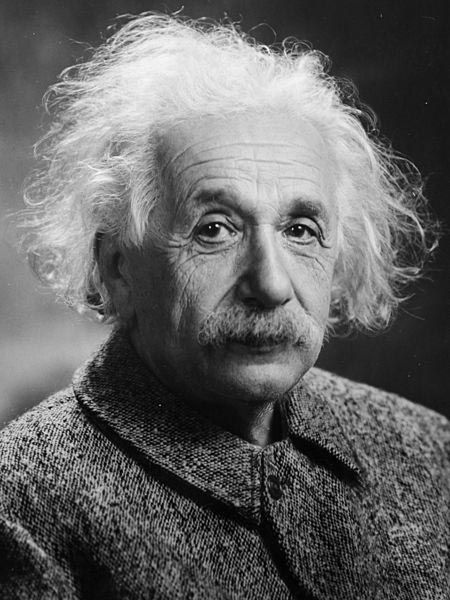 |
| Dat mug |
Click to see Vol. I, Issue 9 of the newsletter in which this article first appeared.
Listen to the audio of this article!
Perhaps no scientist in history has achieved the public recognition of the German Albert Einstein (1879-1955). His name and face (not to mention his hairstyle) seem to be known around the world.
As familiar as his face is, though, few of us really understand his insights. That is, although "the world's most famous equation"--E=mc2--is almost as well-known as his appearance, being able to recite it without grasping it is about as far as most of us can go.
The formula is part of Einstein's famous "theory of relativity." It demonstrates the equivalence of energy (E) to mass (m) in any quantity of matter, saying that the amount of energy (in Joules) in matter is equal to the amount of matter (in kilograms) times the speed of light (c) squared (expressed in meters per second). (A Joule is a measure of energy, basically the amount needed to move something one meter.)
Again:
- E: Energy
- =: is equivalent to
- m: mass
- c: the speed of light
- 2: (written as a superscript) squared, or times itself
"Energy = mass times the speed of light squared."
Or, the amount of energy in any "thing" is equivalent to the amount of mass in that thing times the speed of light squared. (One needs to use the correct units for each value to make this work: Joules, kilograms, and meters per second.)
The theory remained controversial for many years; his 1921 Nobel Prize in Physics did not include any citation to relativity at all.
Einstein was born in what was then the Kingdom of Württemberg. His father was a businessman and engineer, who made electrical equipment in Munich. Though a non-observant Jew, Einstein attended Catholic school for three years, and then a public primary and secondary school for seven more years.
After his father's business failed, the family moved to Italy. Albert stayed on in Germany a little longer to finish at the German school, but noted later that he hated the "rote learning" there. He joined his family in Italy at the end of 1894.
At age 16, he entered a polytechnic school in Zurich, Switzerland, where his grades were good but he did poorly on examinations. There he met his future wife.
After having two children with his first wife, he divorced her in 1919. He remarried almost immediately (to a woman he had had an affair with since 1912) and in 1933, the couple immigrated to America. His second wife died there in 1936.
During World War II, Einstein contributed to the Manhattan Project, which developed the atomic bomb for America. Some of his public reputation is based on his later opposition to nuclear weapons.
Surprisingly, he was offered the presidentship of the then-new nation of Israel after the death of the first president. He regretfully turned it down.
Much has been made of Einstein's thoughts on religion and philosophy. Like Mark Twain and Abraham Lincoln, he often has things attributed to him that he never said. But he did in fact say some things on subjects outside of science, and his thoughts are well worth reading. Try The World as I See It for starters.
 |
PRACTICE:
Vocabulary: Match the words to their meaning. Correct answers are in the first comment below.
- attributed
- controversial
- equation
- equivalence
- formula
- immigrated
- insights
- non-observant
- opposition
- rote
- not following the practice of a religion
- condition of being the same
- by memorization, without understanding
- assigned to; credited to
- not accepted by all; causing disagreement
- a symbolic expression of a rule or principle
- objection to; antagonism toward
- moved into another country
- ideas; discoveries
- a mathematical sentence in which both sides are balanced
Questions to Answer: Answer the following questions in your own words. Suggested answers are in the first comment below.
- What is Einstein's formula (E=mc2) meant to tell us?
- What do the three letters (E, m, and c) mean in Einstein's famous formula?
- Did Einstein's Theory of Relativity make him famous?
- What famous project did Einstein work on in America, and what was its purpose?
- How did Einstein feel about nuclear weapons later in life?
Questions to Think About: These questions do not have "right" or "wrong" answers. They only ask your opinion.
- What would cause a person like Einstein to change his mind about something like nuclear weapons?
- Many people thought Einstein was "wise" about religion and philosophy. Does being good at one thing mean you're automatically good at everything?
- Einstein had an affair in his 30s, then divorced his wife and married his lover. How should a person be judged for something like that, no matter his accomplishments otherwise?


ANSWERS:
ReplyDeleteVocabulary: 1. D; 2. E; 3. J; 4. B; 5. F; 6. H; 7. I; 8. A; 9. G; 10. C
Questions to Answer (suggested answers; yours may be written slightly differently)
1. Einstein's formula tells us the amount of energy in any particular amount of mass.
2. E means Energy; m means mass; and c means the speed of light.
3. No, he received a Nobel Prize in Physics for an earlier discovery.
4. Einstein worked on the Manhattan Project that developed the atomic bomb.
5. He was opposed to them.
Questions to Think About do not have any single correct answer. However, any answers you give should be supported by what you read or by things you know ("I think... because...").